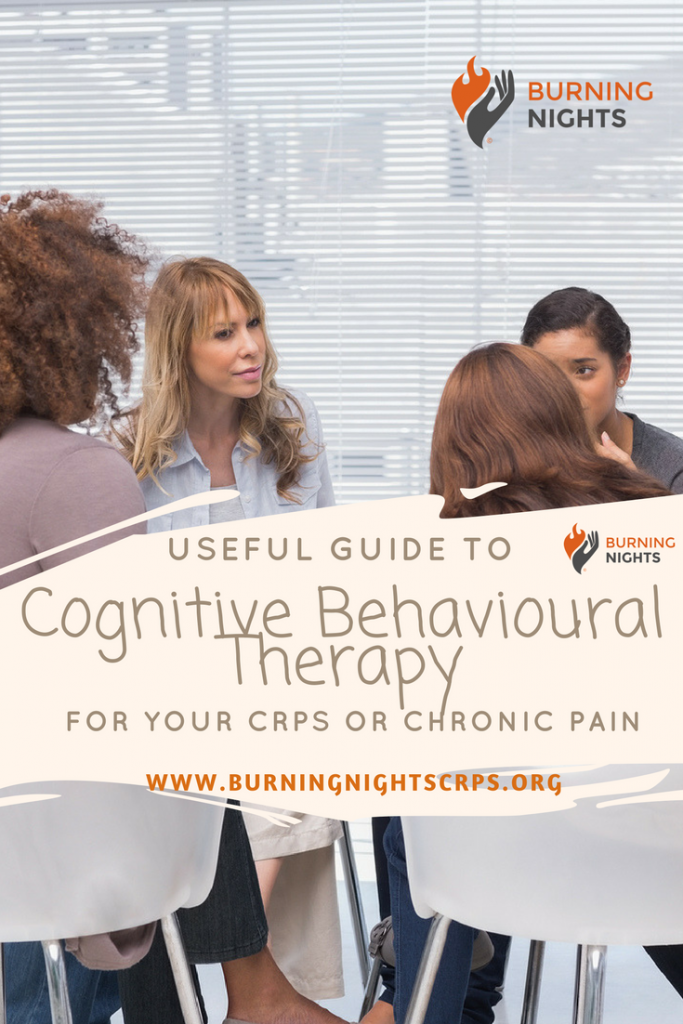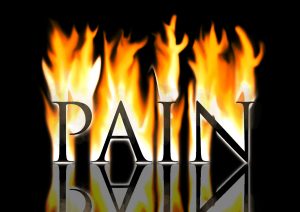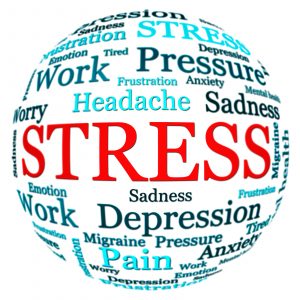We use cookies to improve your experience. By accepting you agree to our cookie policy


What is Cognitive Behavioural Therapy, or CBT, for Complex Regional Pain Syndrome (CRPS) and persistent or chronic pain? How is CBT going to help you with your CRPS or chronic pain?
You're might be thinking "I'm not crazy! The pain is real! My CRPS is real! So why has my doctor said I need to see a psychologist and consider psychological treatments?" All of these questions are quite normal and no, neither we nor your doctors are saying that your pain is in your head, because it isn't. But, trying to understand and apply some of the various psychological treatments or therapies that are available can help you begin to cope, manage and accept your CRPS or chronic pain physically, psychologically and emotionally.
This page has been produced as part of a series of blogs and articles by Burning Nights CRPS Support on the Psychological Treatments for CRPS and Chronic Pain.

The psychological effects of Complex Regional Pain Syndrome (CRPS) should never be underestimated in any way and after being diagnosed with CRPS, you can ask for psychological therapies as part of your treatment plan, if you are not offered it.
Cognitive Behavioural Therapy for CRPS and chronic pain is just one such psychological therapy that can help you learn to alter the way you think, which will then lead to altering how you actually feel and cope with your pain. Learning to apply the techniques from CBT can eventually help you to self manage your chronic pain and CRPS. Usually, a course of CBT for CRPS and chronic pain is considered to be a talking therapy (British Association for Behavioural & Cognitive Psychotherapies).
CBT therapy for CRPS or chronic pain will usually involve various techniques such as:
One of the main issues that can cause many problems, including the advancement of CRPS or chronic pain, is the fear of moving your affected limb due to pain reasons. It is known as fear avoidance or pain-related fear avoidance. This means that when you are going to move your CRPS-affected limb or extremity, you immediately think that it will be very painful when you move it and so you stop moving the limb or extremity or you don’t move your limb because you know it is going to be extremely painful for you.
The fear of injury or movement has been identified as a potential predictor of chronic disability in Complex Regional Pain Syndrome Type I (CRPS-I). It is this fear of injury, combined with the increased pain sensitivity, that may lead to excessive guarding of your CRPS limb and overprotective behaviours, which may worsen the pain.
It is paramount that CRPS patients and their family receive early education on the perils of disuse of the affected limb. Fear of movement is quite common, as movement could trigger pain in a patient with CRPS, but this can lead to disuse atrophy and could hamper physical rehabilitation.

Living with Complex Regional Pain Syndrome (CRPS) or chronic pain will usually involve a team various health professionals, which may include psychologists, mental health experts or counsellors. One of the psychological treatments suggested for CRPS or chronic pain is Cognitive Behavioural Therapy (CBT). This will teach you to help control your pain without the use of medication and to cope both emotionally and physically with all the problems that CRPS and chronic pain throw at you.
You might read this and think "There's no way I can cope with the amount of pain I'm in without the help of medication." Well, the answer is, Yes - you will be able to cope without medication sometimes. That is what CBT and other psychological treatments are there to try and help you to achieve - living through the pain and flare ups, without medication.
Having chronic pain or a chronic pain condition, like Complex Regional Pain Syndrome, patients can very easily get into bad habits of doing some exercise or an activity and then resting for only a short time. Then, as you rest, you begin to think negatively, saying phrases like "I can't carry on, I'm in too much pain"
The way Cognitive Behavioural Therapy for Pain works, is by helping to point out the negative ways of thinking and behaving. This can help identify where to make positive changes to your thoughts and life, which can in turn reduces the pain (Get Self Help, UK). The main focus is on how you THINK and ACT now, rather than what has happened in the past. CBT for chronic pain helps you to try and make sense of your overwhelming problems by simply breaking them down into smaller and more manageable parts.
According to a research study, there is evidence to suggest that Cognitive Behavioural Therapy is effective in treating chronic pain conditions and chronic pain in general, including chronic pain from cancer (Keefe, F.J. 1996). Bruehl, S. & Chung, O.H. (2006) stated that cognitive behavioural therapies are effective treatments for CRPS Type I or CRPS-I.
There have also been a number of cognitive–behavioural exposure in vivo treatments that have been developed, specifically targeting catastrophic (mis)interpretations of bodily symptoms, including pain (Vlaeyen, J. et al.; IASP Press 2012).
These fear-reducing techniques are based on experimental and clinical findings that when individuals expose themselves to painful movement, rather than avoid them, they can readjust their expectations about the associations between movements and increased pain.

According to Get Self Help, there are a number of factors that contribute to more pain on top of your chronic pain or chronic pain condition, like CRPS. They believe that those factors are:

Sessions of Cognitive Behavioural Therapy (CBT) for pain might be either on your own with the therapist or in a group setting. The number of sessions that you require will depend on the sort of problems you need help with. Each session is between 30-60 minutes and on average there are between 5-20 weekly sessions.
You should be able to see a therapist in different settings, such as the therapist's own office or their home, local hospitals, clinics or your doctors surgery. You can also buy CDs or MP3s, so you can carry on with your CBT while you are at home, during your lunch hour or on your way home.
Your therapist may also give you goals to try and achieve in between the face-to-face appointments. Some CBT for chronic pain therapists can also do telephone or online video appointments to help check on how you’re doing and give you some tips on getting over any difficulties you may have been having, as you try to practice what the therapist has been helping you with. (British Association for Behavioural & Cognitive Psychotherapies)
It is during these CBT sessions that you work with your therapist or psychologist to break down your problems into individual parts, i.e. thoughts, physical feelings and actions. You need to remember that your therapist won’t tell you what to do, but they will help you decide on what areas you need to work on to help improve things.
Together you will study each of the areas and decide whether they are not helpful or unrealistic and then also determine the effect that these areas have on you and on each other (NHS Choices). Your therapist will then be able to help you work out how to change unhelpful thoughts and behaviours, including by helping you to set goals to accomplish. This will involve some hard work on your part, not only in the sessions themselves, but also outside of the sessions.
CBT for chronic pain or CRPS doesn’t solve things instantly; it is not a quick therapy by any means. Once you learn and overcome your goals, your life can be helped in a good way so you can eventually deal with your chronic pain or CRPS in every day life, which is so important.
The Mayo Clinic has some good information to how each session is planned, confidentiality issues, the steps in the sessions and length of psychotherapy. Visit the Mayo Clinic Website for CBT for more information.

There are a few things that you can do yourself, in between CBT sessions or before your sessions start (Get Self Help, UK):

Another good CBT technique for chronic pain or CRPS is goal setting. This is where you decide on short-term goals and build up using small steps by breaking down goals into smaller, more manageable pieces. Mind Tools have an excellent page on goal setting and the 5 Golden Rules:

There are several advantages, as well as disadvantages, of Cognitive Behavioural Therapy for CRPS or chronic pain, just as there are with other treatments.
If you’re in the UK, speak to your GP who may be able to refer you for Cognitive Behavioural Therapy (CBT) as it is free on the NHS. Please be aware that there might be a wait for you to see someone.
You are able to access CBT sessions on a private basis, which would be paid for. In the UK, the cost of private CBT sessions varies around the country, but is approximately £40-100 per session. Contact your GP and ask if they can recommend a local therapist for CBT to help you with your CRPS or chronic pain. If they are unable to help you or if the therapist does not take on clients on a private basis, check the various associations below for further details.
Please remember to always check the qualifications and credentials of your therapist if you have referred yourself.
Cognitive Behavioural Therapy for CRPS and Chronic Pain can be a worthwhile pain management tool to help you with your thoughts, feelings and eventually help you cope with everyday life while having chronic pain or a chronic pain condition like CRPS. Please seek medical advice from your doctor before starting any new treatments, including CBT.
Burning Nights CRPS Support has written a number of articles on living with Complex Regional Pain Syndrome and chronic illness. Here are some you may be interested in:
*Burning Nights CRPS Support is a registered charity. We are not doctors or specialists and therefore cannot make any diagnosis, provide treatment, etc. You must speak to your doctor or healthcare professional before starting any new treatment. This help is not meant to replace your current treatment regime or medication. If in doubt please contact your doctor or pain specialist first.*
*The details in this blog and website have been taken from reputable websites around the world. We are not responsible for any subsequent actions you may take.*
Last Updated: 19/05/2020
We use cookies to improve your experience. By accepting you agree to our cookie policy
 £
£